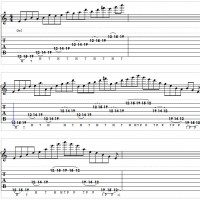 You may have heard that music jobs are almost impossible to find, especially if you’re young and just starting out. While it may be true that few aspiring musicians will reach the top of the charts, there are hundreds of thousands of music jobs available. Some are for performers, some for teachers, and some for support staff for musicians and performers. Musicians and others in the music industry may work in production, performance, promotion, and education – even medicine. I promised you the top music jobs that most people don’t know about – but that’s not technically true. Many of these are jobs that people know about – but don’t consider when they think of ‘music jobs’. Ready for the list? Here we go:
You may have heard that music jobs are almost impossible to find, especially if you’re young and just starting out. While it may be true that few aspiring musicians will reach the top of the charts, there are hundreds of thousands of music jobs available. Some are for performers, some for teachers, and some for support staff for musicians and performers. Musicians and others in the music industry may work in production, performance, promotion, and education – even medicine. I promised you the top music jobs that most people don’t know about – but that’s not technically true. Many of these are jobs that people know about – but don’t consider when they think of ‘music jobs’. Ready for the list? Here we go:
Music Jobs for Songwriters:
- A Staff Songwriter works for a record or media company and writes songs for the artists signed by the label.
- A Freelance Songwriter writes and markets his or her own songs. Your hours are your own, but you’ll have to work a lot of them to get your songs heard.
- A Lyricist writes just the words to songs. He may team up with a composer, or be teamed up with one by a music production company.
- A Jingle Writer writes those catchy ads that you hear on the television and radio – you know, the ones that get stuck in your head for days. A jingle writer may not become a famous household name – but he or she will always find work.
Music Jobs in Publishing:
- A Music Publisher finds and acquires the copyrights to songs with the intent of licensing or selling them to record companies and musicians.
- A Copyright/Licensing Administrator ($20,000 – $60,000) manages the licensing and copyrights for a music publishing company.
- A Music Editor ($20,000 – $60,000) works closely with the composer to document, organize and time cues for the musicians in a project.
- A Notesetter ($15,000 – $50,000) transcribes music from audio to the page.
Music Jobs in the Record Business:
- An A&R Coordinator (artist and repertoire) finds talent for a record company to sign.
- His boss is the A&R Administrator, a position that includes planning budgets for artists, managing reps and coordinators and monitoring the expenses on production.
Public Relations music jobs range from assistant publicist to director of public relations. The PR department is responsible for getting the names of the artists on a record company label out in front of the public often. Pay ranges from nothing for an intern to three figures for highly experienced public relations managers.
- An Artist’s Relations Representative is responsible for maintaining communication and cooperation between the record company and an artist or band.
- A Promotional staffer works with radio stations and video stations to get airplay for a label’s records.
- Campus representatives are promotional agents – but they work directly to promote a record label’s products to college students and music retailers. Working as a campus representative is a great way to get your foot in the door at a record label.
Music Jobs in Education:
- A music teacher teaches music to classes from pre-school through college, with duties varying depending on the age of the classes. In the elementary grades, the music teacher may concentrate on teaching music appreciation and theory, with some teaching of instruments and performance theory. By high school, the job duties are more varied and may include directing student performances and organizing and directing a band or choir.
- A Music Director or Supervisor is responsible for managing and setting policy for music instructors hired by the school department.
Music Jobs in the Ministry may include part-time work as an organist to full-time work directing a professional choir and the entire music worship for a parish or citywide.








